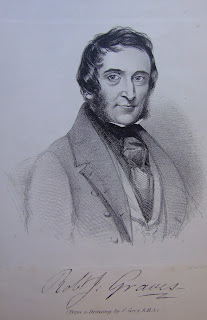Feeding a Fever with the Graves Cafe
Over the summer No 6 Kildare Street, the home of RCPI, is opening a cafe in the Graves Hall. But just who was Graves?
Robert James Graves (1796-1853) was a very influential Fellow and President of the College. Shortly after graduating from Trinity
College, Dublin (1818) Graves travelled to and trained in Europe, starting in
London, then going onto France, Italy, Copenhagen, Berlin and Edinburgh, returning to
Ireland with fresh ideas on teaching and heavily supported bedside training for
doctors. This he practiced alongside his
colleague in the Meath Hospital, William Stokes and their influence would
spread to North America and from there throughout the English-speaking world.
 In 1822, while Ireland was in the grip of
famine, Graves volunteered to travel to the west of Ireland to assist with the
outbreak of typhus fever which had reached epidemic status. During this period Grave wrote extensively on
the treatment of fever, which later lead to a revolutionary new management of
fever – encouraging patients to eat, where before very sparse diets were the
norm. 1832 brought another epidemic to
Ireland, Cholera. Graves was
instrumental during this period in tracing the origin of the disease, proving
that it was in fact infectious, a much disputed theory and how it spread.
In 1822, while Ireland was in the grip of
famine, Graves volunteered to travel to the west of Ireland to assist with the
outbreak of typhus fever which had reached epidemic status. During this period Grave wrote extensively on
the treatment of fever, which later lead to a revolutionary new management of
fever – encouraging patients to eat, where before very sparse diets were the
norm. 1832 brought another epidemic to
Ireland, Cholera. Graves was
instrumental during this period in tracing the origin of the disease, proving
that it was in fact infectious, a much disputed theory and how it spread.
Graves was an advocate for, and practitioner
of, continued educations for medics, maintaining that in order to retain credibility
a teacher must keep up to date with modern advances and practices, along with
reading and research.
In 1853, he purchased Clogan Castle in
Banagher, Co Galway, on the urging of his third wife, unfortunately he would be
unable to enjoy his retirement to the country as he died shortly after the
purchase was completed.
In 1877 a statue of Dr Robert Graves was
unveiled in the main hall of the College, and still stands in the Graves Hall, along statues of his
colleague William Stokes, Sir Dominic Corrigan and Sir Henry Marsh.
Lynn Coady
Events Team, No 6 Kildare Street